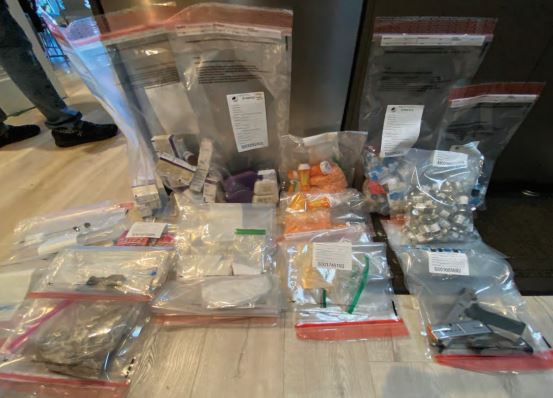Five people have been charged in connection with Matthew Perry’s death from a ketamine overdose last year, including the actor’s assistant and two doctors.
But there’s one person in particular, thanks in part to the media-friendly nickname given to her by prosecutors, that’s been capturing the lion’s share of attention. Prosecutors allege that she’s the one who supplied the drugs that were injected into Perry’s system the day he died.
Jasveen Sangha, a dual U.S. and U.K. citizen who lives in North Hollywood, has allegedly been selling ketamine and other underground drugs for years, leading federal prosecutors in the Perry case to dub her the “Ketamine Queen.”
The 41-year-old, according to court filings, was the distribution point for the ketamine that killed Perry. The indictment alleges that Sangha sold the drugs on Oct. 24, 2023, just days before Perry was found drowned in the heated end of a pool at this Southern California home.
Sangha now faces nine charges, including conspiracy to distribute ketamine and distribution of ketamine resulting in death.
She pleaded not guilty on Thursday, but a magistrate judge said she should remain in custody.
Her home, called the “Sangha Stash House” in the indictment, was where she is alleged to have packaged and distributed drugs.
She “only deal(s) with high end and celebs,” the indictment quoted her co-accused Erik Fleming, an acquaintance of Perry’s, as saying.
After Perry’s death, federal agents and detectives searched Sangha’s home. They found approximately 79 vials of ketamine, three pounds of orange pills containing methamphetamine, hallucinogenic mushrooms and cocaine.

A photo from the indictment showing alleged evidence discovered at what authorities have called the “Sangha Stash House.”
http://www.justice.gov
While Sangha’s Instagram account is now set to private, The Independent reports that she “appears to have enjoyed taking lavish vacations and club hopping in L.A. with friends,” and that photos posted to the social media account showed her travelling to Japan on Nov. 8, 2023, less than two weeks after Perry died.
Jasveen Sangha “only deal(s) with high end and celebs,” the indictment quoted her co-accused Erik Fleming as saying.
She was also reportedly tied to another drug-related death in 2019, prosecutors in Perry’s case said, when she allegedly sold ketamine to 38-year-old Cody McLaury several hours before he died from an overdose.
Following his death, the indictment says, McLaury’s family texted her to report that he had died from a ketamine overdose and after she received the message she did a Google search asking “Can ketamine be listed as a cause of death?”
Of course, there are four others who were also charged in Perry’s case on Thursday, each of them allegedly involved in “(taking) advantage of Mr. Perry’s addiction issues to enrich themselves,” said U.S. Attorney Martin Estrada as he announced the charges at a press conference.
“They knew what they were doing was wrong,” Estrada continued.
Breaking news from Canada and around the world
sent to your email, as it happens.

Get breaking National news
For news impacting Canada and around the world, sign up for breaking news alerts delivered directly to you when they happen.
Perry was undergoing ketamine therapy for depression and had last been treated over a week before he died, according to the autopsy report, meaning he had been receiving additional, illicit ketamine injections when he died.
At the time of his death, the actor had about 3.54 micrograms per milliliter of ketamine in his bloodstream — nearly three times the amount normally prescribed.
Prosecutors claim Sangha began supplying ketamine to Perry after fellow defendant Dr. Salvador Plasencia initially learned that the actor was interested in the drug. Plasencia sourced it from Dr. Mark Chavez, another defendant in the case who had previously operated a ketamine clinic.
“I wonder how much this moron will pay,” Plasencia said in a text message to Chavez, according to the indictment. “Lets find out.”
The prosecutors allege that it was Plasencia that taught Perry’s live-in assistant, co-accused Kenneth Iwamasa, how to administer Perry’s illicit ketamine injections.
U.S. Attorney for the Central District of California, Martin Estrada, speaks during a press conference on August 15, 2024, announcing arrests in the death of “Friends” actor Matthew Perry, in Los Angeles.
Patrick T. Fallon / AFP via Getty Images
From September until Perry’s death in late October, the doctors provided Iwamasa with about 20 vials of ketamine at a price of US$55,000 (more than C$75,000) in cash, federal prosecutors said.
By mid-October, however, Iwasama sought out an additional source of ketamine, the indictment reads. He reached out to Fleming, who had ties to Sangha and allegedly coordinated the sales between her and Iwamasa.
On Oct. 28, Iwamasa injected Perry with at least three shots of ketamine using syringes provided by Plasencia, according to the indictment.
“These defendants cared more about profiting off of Mr. Perry than caring for his well-being,” Estrada told reporters.
Both Plascencia and Sangha pleaded not guilty to the charges against them Thursday. Iwamasa pleaded guilty to one count of conspiracy to distribute ketamine causing death, Chavez agreed to plead guilty to one count of conspiracy to distribute ketamine and Fleming pleaded guilty to one count of conspiracy to distribute ketamine and one count of distribution of ketamine resulting in death.
“Matthew Perry’s journey began with unscrupulous doctors who abused their position of trust because they saw him as a payday,” Drug Enforcement Administration chief Anne Millgram said at the Thursday news conference. “And it ended with street dealers who sold him ketamine in unmarked vials.”
© 2024 Motorcycle accident toronto today, Toronto Car Accident News.




